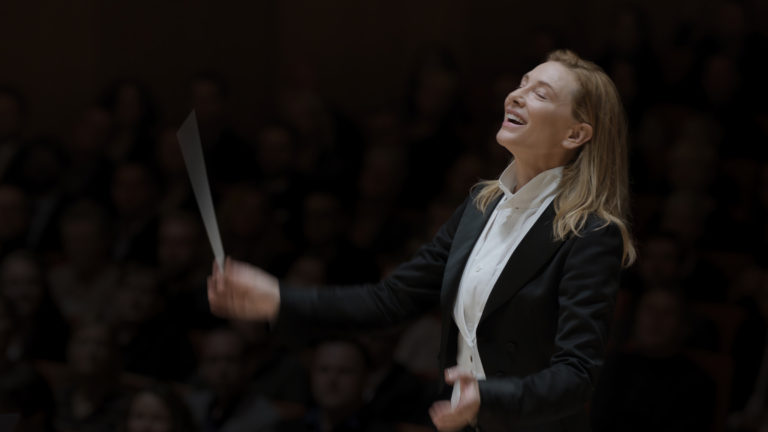TÁR (2022 | USA | 158 minutes | Todd Field)
Starring the legendary Cate Blanchett, TÁR is Todd Field’s cinematic masterwork of the season. We spend two hours and forty masterfully controlled minutes with the prodigious, highly-lauded, multiple-degreed conductor Lydia Tár. The maestro at the Berlin Philharmonic, a protégée of Leonard Bernstein, she is at the pinnacle of not just her, but any conductor’s, career. She’s won an Emmy, a Grammy, an Oscar, and a Tony (let the speculation begin on some of those EGOT categories).
As the story opens, she is being interviewed by Adam Gopnik (as himself) at a New Yorker festival about her ability to manipulate time and channel long-dead composers’ intentions. Later, we see her taking lunch with a wealthy and emotionally-needy donor, playing as nice as her temperament allows given his status. Her guard drops and she code-switches when giving a provocative masterclass at Julliard in which she excoriates “robotic” conductors and challenges students for subscribing to the boring narcissism of small differences. All of these petty distractions fill the spaces as the great genius makes preparations to finally complete the monumental cycle of conducting and recording Mahler’s fifth symphony.
In nothing short of a tremendously singular performance, Blanchett conjures this prickly character from the ether. Fully-formed and outfitted in impeccably-tailored clothing that exquisitely suits her particular style of movement, she holds the camera’s attentions for nearly every moment of the film’s running time. Attended by a meticulous assistant and married to her orchestra’s principal violinist (Nina Hoss, a master of the meaningful glance) she seemingly conducts her own life like a note-perfect symphony, bending each interaction to her own wills and desires. Having long-since shed any pretense of likability, she is nevertheless the center of every interaction and it is impossible to look away.
Of course, for those at the top, there is only one direction left to go. Shot in gleaming cool tones, Field creates sleek world for her to inhabit, before judiciously revealing how the chinks in Lydia’s armor are a setup for a slow-burning psychological thriller. From the beginning, though, something is amiss. Tár’s everyday interactions are sometimes caught by cell phone video overlaid with snide commentary. Mystery lingers at the periphery with the delivery of oddly upsetting gifts and messages that trigger insomniac tendencies and apparent auditory hallucinations that no amount of gazelle-like runs through Berlin or bouts at the boxing gym can eradicate.
Hers is the type of success that has arrived at exactly the wrong moment in history, a towering figure whose appetites and attitudes are increasingly unsuited to the present moment. She tolerates the administrative procedures at the symphony, but only grudgingly and always has her finger on the scale to achieve her own ambitions. The nagging sense that something (or some things) are not as they seem crescendo, acts of favoritism (and lack thereof) become more and more brazen, and lack of concern for the implications buzz ever more loudly. An often unsettling descent into the unknown, Field’s true cinematic achievement and the masterstroke of Blanchett’s creation is having been granted access to the slick reptilian mindset of this consummate achiever, we nevertheless cling tightly, following her into the swirling vortex and undertow driven by her own determination, consequences be damned.
It may not be the most traditionally “enjoyable” film I saw at Telluride — such simple pleasures would defy its protagonist — but it is easily the most brilliantly executed. More than a month later, it’s discordant melodies are still stuck in by head.
A previous version of this review ran during our coverage of the Telluride Film Festival, where Blanchett Received the Silver Medallion and a Tribute Screening. TÁR is now playing in local theaters.
Lead image: Florian Hoffmeister / Focus Features.




